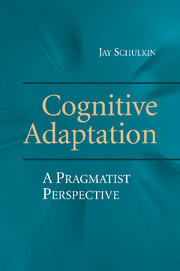Description
Cognitive Adaptation
A Pragmatist Perspective
Author: Schulkin Jay
Argues that there is a fundamental, evolutionary link between cognitive systems and evolution that underlies human activity.
Language: English
Subject for Cognitive Adaptation:
Approximative price 41.94 €
In Print (Delivery period: 14 days).
Add to cart
Cognitive Adaptation
Publication date: 11-2014
Support: Print on demand
Publication date: 11-2014
Support: Print on demand
Approximative price 100.60 €
Subject to availability at the publisher.
Add to cart
Cognitive adaptation, a pragmatist perspective
Publication date: 09-2008
210 p. · 15.2x22.9 cm · Hardback
Publication date: 09-2008
210 p. · 15.2x22.9 cm · Hardback
Description
/li>Contents
/li>Biography
/li>
Cognitive Adaptation: A Pragmatist Perspective argues that there is a fundamental link between cognitive/neural systems and evolution that underlies human activity. One important result is that the line between nature and culture and scientific and humanistic inquiry is quite permeable - the two are fairly continuous with each other. Two concepts figure importantly in our human ascent: agency and animacy. The first is the recognition of another person as having beliefs, desires, and a sense of experience. The second term is the recognition of an object as alive, a piece of biology. Both reflect a predilection in our cognitive architecture that is fundamental to an evolving, but fragile, sense of humanity. The book further argues for a regulative norm of self-corrective inquiry, an appreciation of the hypothetical nature of all knowledge. Schulkin's perspective is rooted in contemporary behavioral and cognitive neuroscience.
1. Cognitive adaptation: objects and inquiry; 2. The human situation: uncertainty and adaptation; 3. Time and memory: historical sensibilities; 4. Education: learning from others, neurogenesis; 5. Cognitive and neurobiological basis of religious inquiry.
Jay Schulkin is Research Professor for the Departments of Physiology and Biophysics and Neuroscience at Georgetown University. He is author of numerous texts, including The Neuroendocrine Regulation of Behavior, Roots of Social Sensibility and Neural Function, Bodily Sensibility: Intelligent Action and Allostasis, Homeostasis, and the Costs of Physiological Adaptation.
© 2024 LAVOISIER S.A.S.




